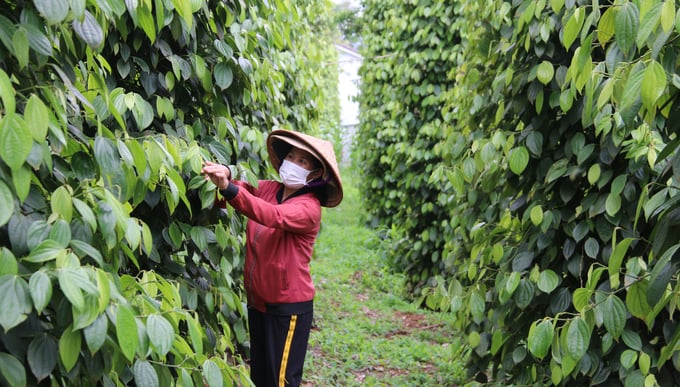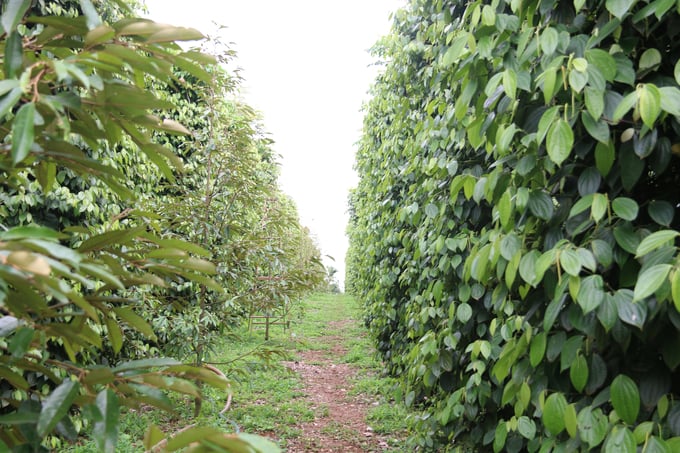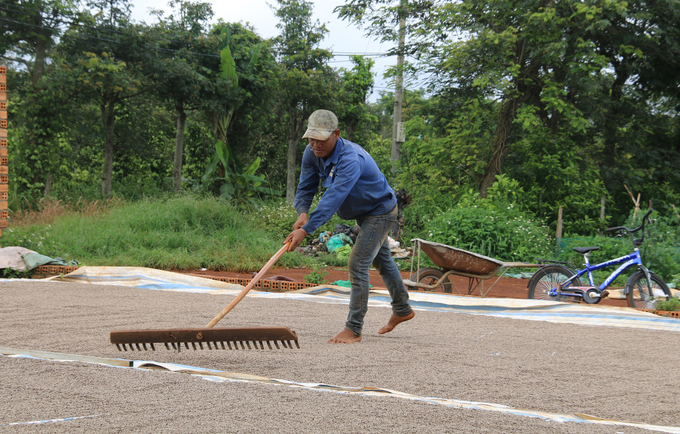November 26, 2025 | 19:06 GMT +7
November 26, 2025 | 19:06 GMT +7
Hotline: 0913.378.918
November 26, 2025 | 19:06 GMT +7
Hotline: 0913.378.918
Ms. Nguyen Thi Tam, a resident of the Dak Song district in the province of Dak Nong, attended the garden in recent days to remove vegetation from the 6-year-old pepper garden that is cultivated according to organic standards.
Tam's family owns over a thousand pepper installations. In the past two years, her family has transitioned from traditional farming to organic farming in order to help the pepper garden grow verdant and vibrant.
"When a family is a member of the Farm Dak Nong Cooperative (Thuan Ha commune, Dak Song district), the family's entire pepper garden does not use chemical fertilizers, pesticides, or herbicides... Instead, biological and organic fertilizers are used to maintain the garden. The production process is meticulously documented and monitored so that the cooperative pays a 25 percent premium for the manufactured goods.

Ms. Nguyen Thi Tam (a resident ofThuan Ha commune) takes advantage of taking care of the organic pepper garden after long rainy days. Photo: Quang Yen.
Producing crops organically is sustainable. Ms. Tam stated that the direct producers' health is not negatively impacted because they are not exposed to hazardous substances.
Mr. Nguyen Van Hoan, a resident of the Thuan Ha commune, has 5,000 pepper posts, which is equivalent to 3 hectares. He used to cultivate conventional pepper, yielding over 6 kg per plant, whereas the current organic pepper yields approximately 5 kg/tree.
According to Mr. Hoan, the transformation to an organic model has resulted in a decrease in pepper tree yield, but the input costs have decreased, resulting in a more sustainable output and significantly higher prices.
"The decision to produce organic pepper was motivated by a desire to protect our own health. If pesticides are exploited, producers will be directly affected first. Moreover, if the organic process utilizing biological products is utilized, pepper will have a longer shelf life and be more popular on the market," Hoan said.

The pepper garden of the members of the Farm Dak Nong Cooperative is organically grown, very green and full of life. Photo: Quang Yen.
According to Mr. Hoan, the entire pepper garden of the family consists of manure. After harvesting, he employs individuals to fertilize around the pepper posts, which are spaced an average of 1 meter apart. The garden is overgrown with weeds, but the garden owner never uses herbicides and instead employs laborers to clear up.
"Organic farming often requires more labor than conventional farming, and yields are also lower. However, organic pepper products have a higher selling price and greater market demand than conventional pepper". Therefore, producers can 'live well' if they grow pepper organically, according to Mr. Hoang.
Dak Nong Farm Cooperative is regarded as one of the foremost organizations in collecting and connecting people to produce organic, safe, and sustainable pepper. There are currently 25 members in the cooperative, and the average pepper production is 4.5 tons per hectare, with some gardens producing 6-7 tons. The cooperative has created employment for 6 to 15 individuals earning approximately 10 million VND per month. The employees have access to organic pepper production techniques, which they can implement in their family's production area.
Mr. Vu Thanh Hoa, the director of Dak Nong Farm Cooperative, stated that after two years of operation, particularly since international certification was obtained, the lives of the members have improved, pepper trees have flourished, and the prevalence of infected or deceased pepper has decreased.

Thanks to organic pepper cultivation, although the yield is lower than before, the income of the members of the Dak Nong Farm Cooperative has increased. Photo: Quang Yen.
During operation, the cooperative has established a CS team (cross-supervising team) to closely supervise the households' production processes.
In order for cooperative members to acquire techniques and meet the stringent requirements of the international market, Farm Dak Nong Cooperative invites experts to speak, exchange experiences, and advise farmers on pepper production on a regular basis. To date, all family members have approached and implemented organic pepper production across the majority of the family's land.
"The Farm Dak Nong Cooperative has altered production methods and increased farmer earnings. Farm Dak Nong Cooperative's pepper product is a combination of scientific knowledge, modern technology, and natural ecosystems. We anticipate that many farmers and cooperatives will have access to sophisticated production methods as a result of this model, said Mr. Vu Thanh Hoa.
Translated by Linh Linh
/2025/11/26/3627-4-082628_818.jpg)
(VAN) From a small café on the red basalt highlands, Le Van Hoang started a business with clean coffee, building Enjoi Coffee into a symbol of organic agriculture in the Lam Dong plateau.
/2025/11/25/0045-1-135246_13.jpg)
(VAN) Ca Mau is researching a model of sea-encroaching embankments combined with viaducts and logistics service zones, aiming both to prevent erosion and create land funds for marine economic development.

(VAN) The information was shared at the seminar 'Urban Agriculture - Solutions for Developing Green Spaces,' organized by the Kinh te & Do thi Newspaper and the Biotechnology Center of Ho Chi Minh City.
/2025/11/19/4141-2-132831_216.jpg)
(VAN) One of Japfa's outstanding solutions is implementing digital transformation and artificial intelligence (AI) to optimize operations, enhance productivity, and advance sustainable development.
/2025/11/19/4847-1-093540_448.jpg)
(VAN) The Gia Lai Provincial People’s Committee had a working session with the delegation of the U.S. Department of Agriculture, the State of Idaho, and representatives of the State's leading enterprises.

(VAN) Ca Mau has a sufficient foundation to become a strong regional aquaculture center, where production integrates the economy, the environment, and the lives of the people.

(VAN) SEIKI Group envisions itself as a pioneer in the ‘dual transformation’ of digital technology and green industry, standing alongside the Government and Vietnamese businesses in their pursuit of sustainable development.